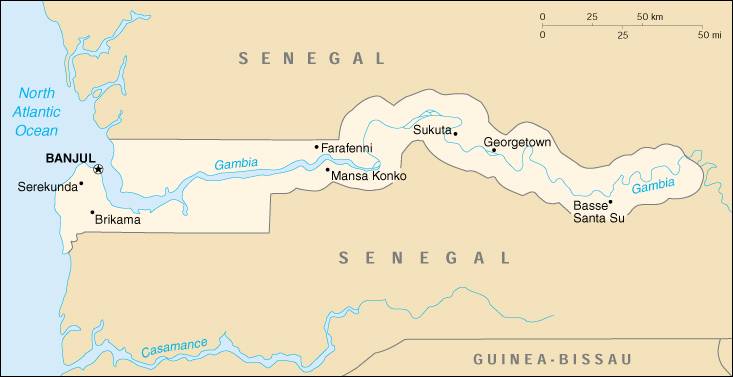 It is rainy season and as the plane flew towards the landing strip at Banjul, the capital city of The Gambia, verdant tropical forests of flat-topped acacia and baobab trees, flooded by seasonal rains fill the landscape. Lying at the western edge of Africa, surrounded on three sides by Senegal, its river defining the countries very existence, the Gambia is one of the poorest countries in the world. With a life expectancy of around 50 years and between 100-200 children in every 1000 dying before the age of five, the average western citizen is up to 100 times better off than their Gambian counterpart. I was about to be dropped into a fragile African nation of diverse cultural expressions.
It is rainy season and as the plane flew towards the landing strip at Banjul, the capital city of The Gambia, verdant tropical forests of flat-topped acacia and baobab trees, flooded by seasonal rains fill the landscape. Lying at the western edge of Africa, surrounded on three sides by Senegal, its river defining the countries very existence, the Gambia is one of the poorest countries in the world. With a life expectancy of around 50 years and between 100-200 children in every 1000 dying before the age of five, the average western citizen is up to 100 times better off than their Gambian counterpart. I was about to be dropped into a fragile African nation of diverse cultural expressions.
Our piled high Land Rover, bursting at the seams with 8 people and luggage, trundled down the major shell and sand made highway, dodging not only flooded pot holes but groups of kerbside children waving and screaming ” Two Bob ” the slang used for white people. As we passed colourful fruit stalls and water laden women carrying receptacles of all sizes on their heads, our team of four American researchers and a lone Brit, headed towards Brikama, one of the larger cities, were master drummer Fabakary Badjie was to be our host.
Fabakary, a Mandinka man had left home at an early age to pursue his drumming, after family confrontations about his playing, but was now very highly respected in his field. His walled family compound consisting of his three wives, children, brother’s family and relatives totalled 50. It was the first time that I had been in a polygamous Muslim society and I had some very interesting conversations on this subject. Men all told me that women are not adverse to this custom of multiple wives, (the Quran allows up to four) and that the wives of one man become like sisters, helping each other with domestic and child-rearing duties. The reality was that all the women I spoke with did not want husbands marrying again. The trouble is leaving a marriage simply because their husband takes another wife would bring a lot of shame on the woman’s own family. Interestingly, the reason why it seemed to work in this compound seemed to be because the wives thought that Fabakary was a fare man.
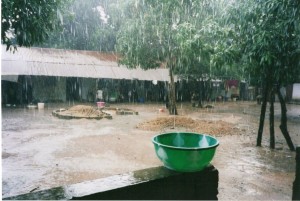 As the laden vehicle turned into the compound young children appeared from everywhere, enveloping the van waving, calling out welcomes and “What is your name?” Little hands explored their new-found friends and I took a look at what was to be home for the next two weeks. The compound had two sides one older living quarter, low small housing with corrugated roofs and a newer stone and cement building directly opposite, one end still under construction. The contributions that you have made to this trip have partly gone to building a complete new housing block on one side of the compound, feeding the family and the buying of the Land Rover which will be left with the family at the end of the research.
As the laden vehicle turned into the compound young children appeared from everywhere, enveloping the van waving, calling out welcomes and “What is your name?” Little hands explored their new-found friends and I took a look at what was to be home for the next two weeks. The compound had two sides one older living quarter, low small housing with corrugated roofs and a newer stone and cement building directly opposite, one end still under construction. The contributions that you have made to this trip have partly gone to building a complete new housing block on one side of the compound, feeding the family and the buying of the Land Rover which will be left with the family at the end of the research.
The next days took me on a whirlwind of emotions as life in the compound constantly brought extremes of sadness and joy. As there is no work, life is very slow and nothing is done in a hurry. Chatting and the practise of drinking tea are the order of most days. After an overnight storm, sand was washed away from the foundations of the back of the compound. The back bedroom and compound wall collapsed leaving rubble strewn everywhere. Adults and children alike pitched in to help clear and shore up the hanging corrugated roof. Just another day!
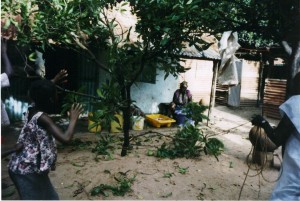 Another night lightning struck a tree, with a huge crash half fell across the compound roofs, luckily the roofing held. In the morning it was all hands to clearing, the excitement was that it was a mango tree and as the branches hit the ground, children piled into the foliage wrestling the bounty from its leaves. Smiling faces clutched armfuls of soon to be breakfast. Another meal came in the way of a captured rat….. that was caught, skinned and diced by the children! These were excursions from the rice, groundnut sauce and a small amount of fish or goat meals that the family survived upon.
Another night lightning struck a tree, with a huge crash half fell across the compound roofs, luckily the roofing held. In the morning it was all hands to clearing, the excitement was that it was a mango tree and as the branches hit the ground, children piled into the foliage wrestling the bounty from its leaves. Smiling faces clutched armfuls of soon to be breakfast. Another meal came in the way of a captured rat….. that was caught, skinned and diced by the children! These were excursions from the rice, groundnut sauce and a small amount of fish or goat meals that the family survived upon.
Being a very male dominated society, the women were the workers, cooking, washing and cleaning which started very early in the morning and involved the children. Respite from chores came in the afternoons when drum practises started and the women often exploded into dance. No real structure to lessons, a youngster has a lifetime of watching and playing on various pots and pans.
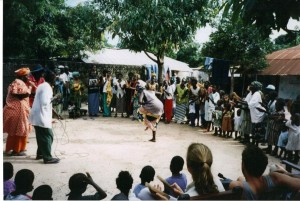 The reason for music in this culture is to help the dance, which in Mandinka culture is solely female orientated. From the day to day running of the compound came the incredible joy of dance, a particularly interesting aspect, as a lot of fundamentalist Muslim countries do not allow dance or music. In the early evenings the performances would be held for many different reasons, naming ceremonies, male or female circumcisions or purely for fun.
The reason for music in this culture is to help the dance, which in Mandinka culture is solely female orientated. From the day to day running of the compound came the incredible joy of dance, a particularly interesting aspect, as a lot of fundamentalist Muslim countries do not allow dance or music. In the early evenings the performances would be held for many different reasons, naming ceremonies, male or female circumcisions or purely for fun.
As the drummers rallied people to join the celebrations, a bubbling circle of expectant dancers, many beautifully dressed in a barrage of batik colours would form in the streets. Mandinka style drumming uses three drummers each playing a different type of drum. The kutirindingo and kutiriba drumsbeing the major rhythm makers, whilst the sabaro is played by the lead drummer. His job is, with the aid of a whistle, to encourage and follow the energetic movements of the participants. Individual dancers would enter the ring and the master drummer’s worth was measured on his ability to capture the dancer’s steps on his instrument.
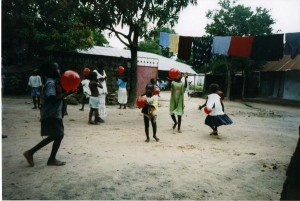 The reason for the trip had been to research this amazing drum music and although this was an incredible learning experience for me, I quickly realised that God wanted me to spend time with the family. In a compound where the English language was fifth in line behind Mandinka, Wolof, Jola and French I was amazed at the friendships that built up, sometimes without the aid of words. I can honestly say that I have never laughed and had so much fun just playing and hanging out. One researcher nicknamed me the Pied Piper, as I seemed to always have a crowd of children with me which opened up some very intimate conversations.
The reason for the trip had been to research this amazing drum music and although this was an incredible learning experience for me, I quickly realised that God wanted me to spend time with the family. In a compound where the English language was fifth in line behind Mandinka, Wolof, Jola and French I was amazed at the friendships that built up, sometimes without the aid of words. I can honestly say that I have never laughed and had so much fun just playing and hanging out. One researcher nicknamed me the Pied Piper, as I seemed to always have a crowd of children with me which opened up some very intimate conversations.
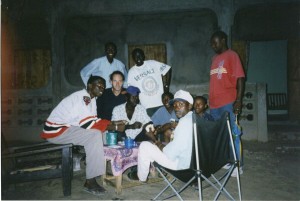 A friend had sent me a scripture before I had left home simply saying ” and they will know by your love,” what an encouragement that was to me in a place where often I felt no hope. God had used the musical emphasis of this project in order for me to build a relationship with a Muslim family which I hope will continue into the future. I had been very nervous before the trip and not really understanding why I felt God wanted me to go to this land, yet again He had shown me that following His footsteps was all He wanted me to do.
A friend had sent me a scripture before I had left home simply saying ” and they will know by your love,” what an encouragement that was to me in a place where often I felt no hope. God had used the musical emphasis of this project in order for me to build a relationship with a Muslim family which I hope will continue into the future. I had been very nervous before the trip and not really understanding why I felt God wanted me to go to this land, yet again He had shown me that following His footsteps was all He wanted me to do.

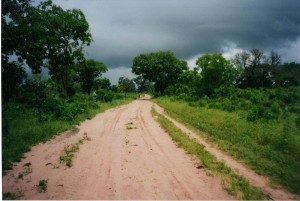
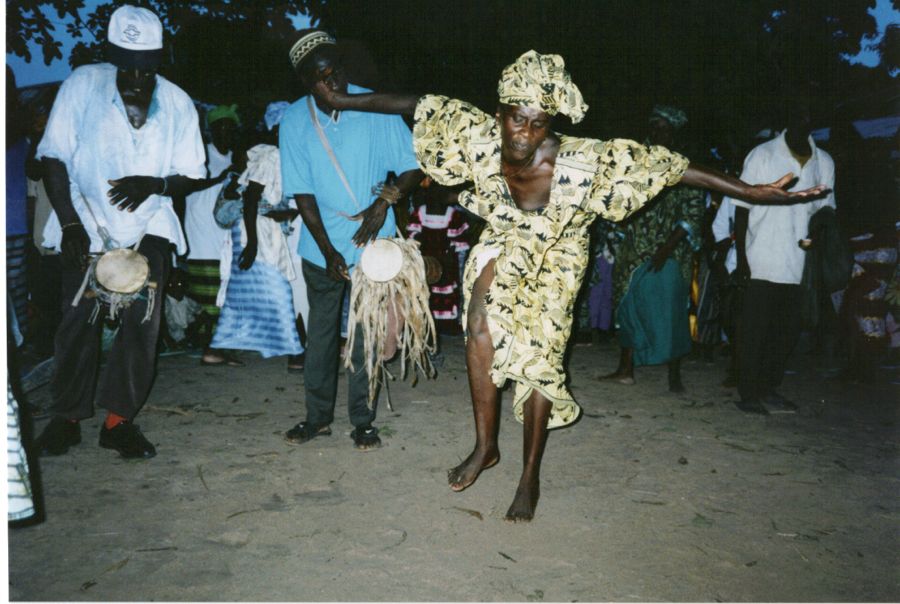
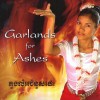
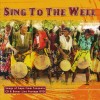

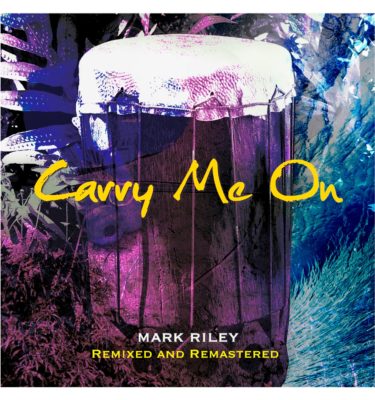
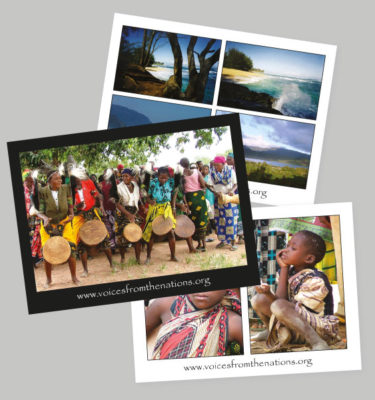
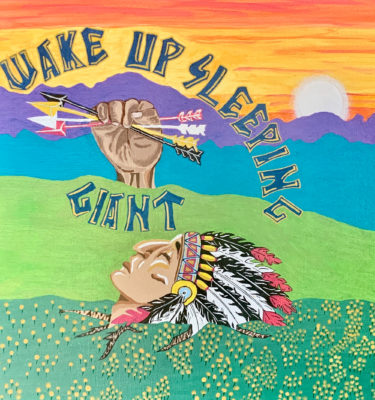
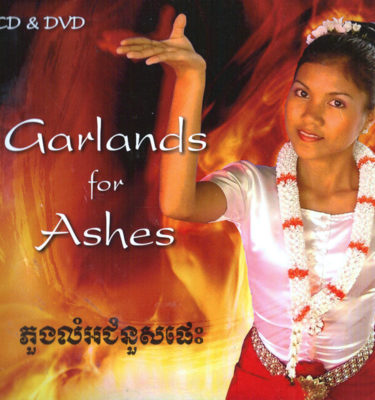

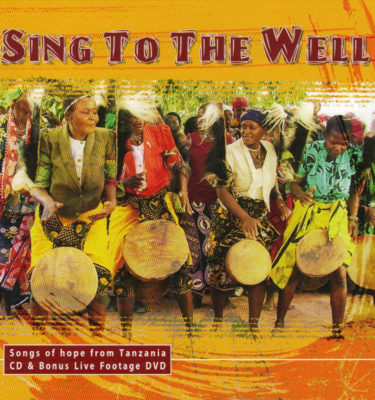


What does the word encouragement mean in Mandinka?
I’m fascinated with the Mandinka language.
You are right the Mandingo language is wonderful … and quite different in the Gambia from Mali. I think “wakilindi” is the word to encourage.